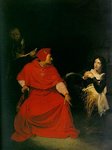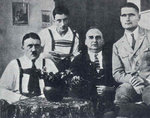avoid emotions from both losses AND wins, because they impair decision-making
Remember how I created an excel file with all the telltale signs of stress and frustration?
I did it to monitor the state of mind which is not right for trading.
Now I also realize that euphoria (following wins) is just as inappropriate, as are all the feelings that arise from winning.
So let's start a little journey on this subject as well, with the help of a dictionary of antonyms:
https://archive.org/stream/completedictiona00falluoft/completedictiona00falluoft_djvu.txt
Quoting from the above-mentioned dictionary the antonyms of...
anger
ANT. Peace, peacefulness, peaceableness, appeasement, forgiveness, good-will, patience, forbearance, reconciliation, conciliatoriness, mildness.
stress
Alleviation, sli^itness, lightness, unimportance, casualty, touch, triviality.
frustration (I didn't find it, but only found various related terms)
Joyous, cheerful, merry, happy, gay, jovial, gladsome, blithe.
fear (here I used "afraid")
Fearless, inapprehensive, unsolicitous, easy, indifferent, secure, confident, bold, hopeful, eager, reckless, audacious, venturesome.
What I am getting at is that euphoria and joy are just as dangerous for trading, because whereas frustration and anger causes you:
1) revenge trading by going again (or adding more contracts without exiting) in the same direction that proved you wrong
2) ignoring stoplosses
... joy and euphoria cause you:
1) feeling powerful, intelligent and picking trades without thinking about them
2) feeling good and blessed by the gods, and this will set you up for disappointments and great anger when you'll lose
Feeling good about yourself when you win should be avoided just as much as feeling bad about yourself when you lose.
You should just do what works, as much as possible, all the time. Without letting feelings interfere with analyzing and implementing what works, both in life and in trading.
I will now proceed to analyze the antonyms listed above and mark in red the ones to avoid and in green the ones that are acceptable (if any). Then I will see what was my rationale for doing so.
ANTONYMS of ANGER
From the antonyms of "anger" I eliminated all those that reminded me of the Christian concepts, such as forgiveness and so on. Obviously trading has nothing to do with this. Regarding being "peaceful", it could be a good idea, although it should not mean that you're not lethal when required. Since I am not just talking about trading but about life in general as well, we must be able to defend ourselves if we're risking physical harm. So, ideally, we should be a peaceful killing machine.
ANTONYMS of STRESS
This series of antonyms alerts us to the fact that there is a very fine line separating these three states of mind: stress, attention, lightness (in the sense of being superficial, sloppy). We must not, after a series of wins (in life or trading) make the mistake of transitioning from attention (a mental state of "stress" also means attention, but too much attention, counterproductive attention, and attention accompanied by fear / panic) to sloppiness and lightness and carelessness.
http://www.merriam-webster.com/dictionary/stress
a state of mental tension and worry caused by problems in your life, work, etc.
We should pay attention, use our brain to the utmost, but not worry. I suspect the difference between attention (good state) and stress (bad state) is that stress is equal to the sum of attention + a series of feelings that interfere with attention: fear, worrying, etc.
And sure enough, the dictionary confirms my reasoning:
http://dictionary.reference.com/browse/stress?s=t
...7. Physiology. a specific response by the body to a stimulus, as fear or pain, that disturbs or interferes with the normal physiological equilibrium of an organism.
So, by definition, stress is never good, and there can be attention without there being stress. A person who is extremely focused is not necessarily stressed. However, a person who is extremely focused, and then you open the door and let into his room an excited dog and a child... may become a stressed person -- something that would not happen to a jovial person. So let us say this: being focused increases your chances of becoming stressed. This explains why I get more easily upset than my colleagues, given that I work meticulously all day long, whereas they're slacking off all day long. Extreme concentration makes you more prone to stress.
So far we have clarified that stress and anger should be avoided, but not all their ingredients are bad. In stress there is a great quantity of attention, and this makes some of the antonyms of "stress" just as undesirable: lightness, triviality and casualty.
So the lesson here is "do not be stressed when you lose" but also "keep paying attention after you win".
ANTONYMS of FRUSTRATION
This might be awful logic and inference, but it seems to me that in this case, since all the antonyms of "frustration" are bad and in red, this also means that there are no good ingredients in frustration to be lost by doing the opposite.
Hmm, let's see. If I write "genius" and then look for the antonym and find "idiot", and find all antonyms to be not desirable, then we know that "genius" only came from good ingredients. Right?
I told you I am not as sharp as I used to be.
Let's keep going.
Then I write "pompous" (ostentatious), which is similar to "stressed" in the sense that not all ingredients are bad, because to be pompous you must also know something, just as someone who is stressed is at least paying attention to the source of his problems. I get these antonyms: "unpretending, unobtrusive, modest, unassuming, plain-mannered, humble-minded". And they're not all good.
Well, ok, let's see how this rationale applies to the antonyms of "frustration", which I marked all in red: "joyous, cheerful, merry, happy, gay, jovial, gladsome, blithe".
Now if the opposite of something bad is all good, then we have the certainty that it was bad, right?
But if the opposite of something bad is only partly good, then we know that maybe it wasn't all bad, right?
What if the opposite of something bad is all bad...?
... Then maybe this tells us that "frustration" is not bad at all?
...Hmm, what I see is that both states have in common emotions. "Frustration" means feeling bad emotionally, and "happy" means feeling good.
But these are both wrong, so this tells us that the enemy is not this or the opposite state but simply an emotional state, simply feeling emotions.
So I am back to an old question: should I abolish emotions altogether (and is it possible?) or should I limit myself to when I am trading or at the office? and also:
1) is it possible to abolish emotions only in certain situations?
2) isn't it easier to abolish emotions altogether?
3) are there situations where having emotions is useful?
ANTONYMS of FEAR:
Here some antonyms are desirable and some are not. This means that fear has positive ingredients, namely the fact that it might help you avoid something bad for you. That's why being "fearless" and similar is not a good thing.
But let's get back to trading and the concept of losses. Do we want losses? Absolutely not. Does this mean that we're afraid of losses?
Good question.
Do I want to be punched in the face? No, and that is why I stay away from fights.
Do I want losses? No, but I don't stay away from trading. Why?
And, also, I am afraid of being punched in the face. It never happened before.
And also, I am afraid of losses.
OK, it seems to me that the answer to why I don't stay away from trading is that a win annuls a loss, which then doesn't leave permanent damage on me. Whereas even returning a punch won't heal my face. OK, and this also tells me that fear of punches is good, because there is something to be feared. But fear of losses does not even make sense, because I can't be afraid of something that doesn't cause me permanent damage (provided that I am a profitable trader). In some rare situations, it might even be good to be able to take a punch, and more convenient than not taking it, but they're not very likely. For example, if someone insulted my girlfriend, I would start running and leave her there. But I'd definitely risk a punch for my parents.
So, recapitulating, if losses cause me anger, stress, frustration and fear, and these emotions have to be avoided because they interfere with my decision-making...
...it is conversely true that wins cause me other emotions to be avoided and also interfering with my decision-making:
superficiality, cheerfulness, recklessness.
By the way:
fearless doesn't mean
reckless. Fearless doesn't mean you are not aware of the dangers. And fearless doesn't mean that you're going to take unnecessary risks. Having said this, I would not be recommend being fearless, but rather not fearing things that cause you no damage. "Fearless" is not a realistic concept for a human, anyway. It's just for actors in a movie.
Anyway, now what I have to do is play the chart game and write down the telltale signs of these three emotions that follow wins (whether in trading or in life): superficiality, cheerfulness, recklessness.
I have already noticed that today, when I received a compliment from my boss and another colleague, I was subjected to these emotions, and I reacted by
talking more than I should have. A compliment triggered cheerfulness, superficiality and recklessness, which manifested themselves through excitement and talkativeness. So these are two telltale signs (excitement and talkativeness) that I have to write down as symptoms of emotions which impair my decision-making.
From now on, when I incur a loss (in life or in trading), I must make sure I don't experience emotions that impair my decision-making, and when I incur a win (in life or in trading), I must do the same exact thing.







